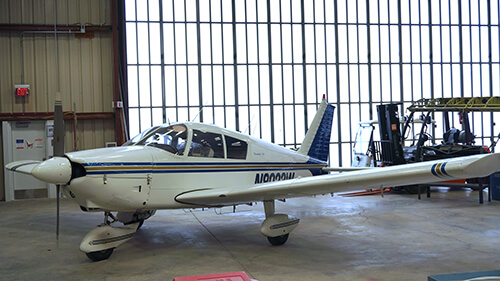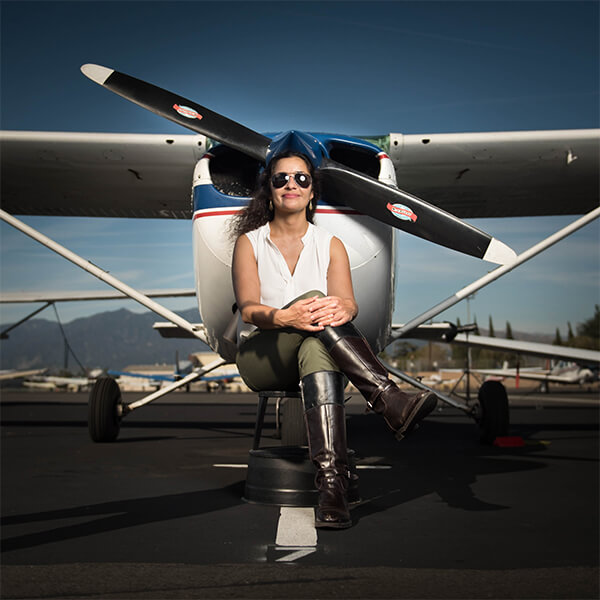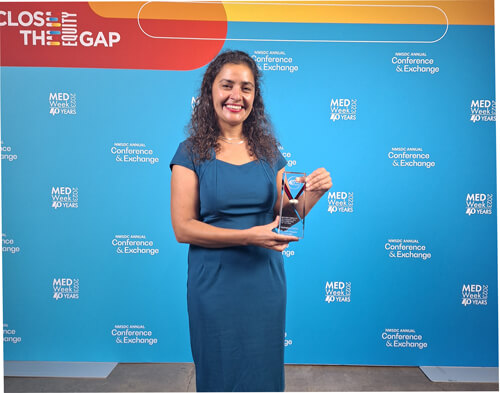
Anita Sengupta (M.S. ‘00, PhD ‘05), Hydroplane Ltd. founder and CEO
When Anita Sengupta (M.S. ‘00, PhD ‘05) is 10,000 feet up in the air, engaged in her favorite hobby of flying single-engine aircraft, she’s in her element.
“At that height, you can really witness the beauty of the landscape – how everything is connected,” said Sengupta. “The desert is connected to the mountains, is connected to the ocean. It gives you a broader understanding of our capacity to impact our environment, for better or worse. Flight is beautiful – and I believe that flight can also be carbon emission free.”
Sengupta’s ecological consciousness inspired her to found her own company, Hydroplane, with the ambitious goal of de-carbonizing aviation. Her team of scientists and engineers is applying the principles of electric propulsion to develop and build a 200-kilowatt hydrogen fuel cell powerplant that will enable sustainable flight – and a paradigm shift in the quest for new sources of renewable fuel.
A scalable solution
The beauty of this solution is that it can be scaled for multiple forms of vehicle including single-engine aircraft, helicopters and regional aircraft, as well as potential use for the marine sector and heavy-duty ground transportation. Not only are these sectors major sources of emissions – they also involve logistical systems that cannot accommodate the extra payload of heavy batteries, further demonstrating the value of liquid hydrogen as a fuel source.
Hydroplane is well on its way to producing the world’s first 100% hydrogen-powered aircraft, an achievement that has been recognized by two U.S. Air Force research and development contracts from the Agility Prime program, which aims to advance the electric vertical takeoff and landing (eVTOL) aircraft industry.

Hydroplane Ltd. testbed aircraft for hydrogen fuel cell powerplant, a Cherokee 180 referred to by the company as Protium
eVTOL is set to be the next revolution in aerospace, and Hydroplane’s startup-style agility has enabled rapid concept prototyping that larger corporations cannot match. Hydroplane’s first hydrogen fuel cell was produced within a period of just 18 months, and the company’s expertise continues to be marked by a series of awards – most recently the Minority Emerging Technology and Industries Firm of the Year Award from the U.S. Department of Commerce.
The art of the possible
The mission to decarbonize aviation is daunting challenge, but if anyone has the brainpower and the training to achieve such a feat, it’s Sengupta; a former NASA engineer, corporate executive, and now a commercial pilot and CEO who has a knack for generating waves of change in each new domain she enters – a shape-shifting attitude of limitless possibility that she credits to her love of sci-fi.
On completing her M.S. Aerospace Engineering at USC, Sengupta’s career began with launch vehicles and communication satellites at Boeing Space and Communications. She then worked for NASA Jet Propulsion Lab for 16 years, where her USC PhD research was incorporated into the development of the electric propulsion systems used in the Dawn mission. Sengupta was also central to the production of the supersonic parachute that landed the Curiosity rover on Mars, the Orion drogue parachute system and the Cold Atom Laboratory – an atomic physics facility on board the International Space Station.
She then transitioned to the corporate world of green transportation solutions, joining Virgin Hyperloop as senior vice president of systems engineering. This gave her a taste of what she calls “the art of the possible” and the challenges of raising money for moonshot engineering initiatives. Next, she spent several years in the battery-powered eVTOL sector which gave her the insight that heavy batteries just can’t carry the aviation industry. With her background in the space sector and electric propulsion, she was able to make the conceptual leap to hydrogen fuel cell technology. Enter, Hydroplane.

Anita Sengupta (M.S. ‘00, PhD ‘05)
Learning to be an entrepreneur
For the last decade, Sengupta has also served as a stellar research professor of Astronautical Engineering at USC where she teaches a graduate course in Spacecraft and Entry System design – drawing upon her experience designing entry, descent and landing (EDL) systems for NASA and enabling the landing of the Curiosity rover on Mars.
So, when Sengupta caught the entrepreneurial bug and decided to launch her own company, she was primed to take advantage of the USC Viterbi Startup Garage (VSG), housed at USC Information Sciences Institute embedded within the tech startup ecosystem of LA’s Silicon Beach. Enrolling for the year-long program in Fall 2021, shortly after launching Hydroplane, she was able to incubate the startup with the support of mentors and like-minded individuals. “Probably the most important thing when you’re a founder is to have that community,” she said. “When you first start out as an entrepreneur, you can’t overestimate the value of having other people with whom to share resources and talk through your challenges, and to have access to that support and accountability.”
For David Eastman, director of VSG, Sengupta exemplifies why the lab was created. “Our goal is to incubate emerging companies with the potential to launch revolutionary technologies, complementing the groundbreaking research that’s taking place at USC Viterbi,” he explained. “We help entrepreneurs to identify how to commercialize, how to get their go-to-market strategy in place, and we position them for the relationships and connections that are vital in securing a successful startup.”
For Sengupta, those connections soon bore fruit. “One of the first presentations organized by VSG highlighted the opportunity space at CalTestBed, a grant initiative offered by the California Energy Commission. I followed up with the presenter afterwards and he encouraged me to apply. It’s a highly competitive program, but we were accepted – that’s just one of the funding sources and competitions that were made available to us through VSG, those steps along the way that put you on a path to success.”
Diversity for innovation
Receiving the Minority Emerging Technology and Industries Firm of the Year Award from the U.S. Department of Commerce is another of those steps – and a great leap forward, not just for Hydroplane, but for the standing of minority-led firms in the aerospace sector.

Anita Sengupta receiving the Minority Emerging Technology and Industries Firm of the Year Award from the the U.S. Department of Commerce
“For me, diversity is everything,” said Sengupta. “As somebody who has always worked in the white male dominated domains of aerospace and high tech, I was determined to build a company that reflected the demographics of the society we actually live in. I wholeheartedly believe that the best solutions are generated through the collaboration of a diverse workforce.”
“We are thrilled to learn of Hydroplane’s and Anita’s award,” said Dean Yannis C. Yortsos. “The award exemplifies scientific ingenuity in innovation, commitment to sustainability and strong entrepreneurial spirit. We are particularly proud that Anita is a USC Viterbi alumna and an adjunct professor in Astronautical Engineering at USC. And with Hydroplane being a Viterbi Startup Garage team, we rejoice even more for their success and national recognition.”
There are still plenty of challenges ahead as we make the transition to green energy. However, Sengupta maintains a steely positivity that gives her the courage to take action despite the odds.
“I faced a lot of opposition when I first proposed the idea of developing hydrogen fuel cell technology,” she remembers. “But sometimes in life you have to do the difficult things because no one else it going to do it but you – if it’s your passion to solve this problem, then you need to take it on. I take my inspiration from the space program of the Apollo era – we do these things, not because they’re easy but because they’re hard. We have to find solutions for green energy sources because we have to protect our planet.”
Published on November 13th, 2023
Last updated on November 13th, 2023











